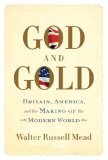Ilankai Tamil Sangam28th Year on the Web Association of Tamils of Sri Lanka in the USA |
|||
 Home Home Archives Archives |
Oceanic World Ordersby Johann Hari, The New York Times Book Review, November 18, 2007
It is impossible to imagine George W. Bush eating cucumber sandwiches on an English lawn while discussing the latest cricket scores. Yet this president, the one with the fewest English airs, has nonetheless inspired rampant Anglophilia among some foreign policy experts. With his unashamedly “civilizing” mission in the Middle East, and his deployment of gunboats as a tool of diplomacy, Bush has sent intellectuals dashing back to the British Empire for parallels and predecessors. Walter Russell Mead, a senior fellow at the Council on Foreign Relations, is the latest to trace the connecting fibers between George III and George W. He argues in “God and Gold” that America — a country founded in a rebellion against the British Empire — has, in fact, become its logical successor. He believes every age needs a “liberal empire” to control the world’s seas and make free trade possible. This was discovered by the United Provinces of the Netherlands four centuries ago, then by the United Kingdom — and now by the United States. Indeed, “the last 400 years of world history can be summed up in 10 letters. ... The story of world power goes U.P. to U.K. to U.S.” Each of these “liberal” maritime empires defeated towering, glowering rivals. From the Spanish Armada to Soviet tanks, they prevailed for one reason: they adhered to an unwritten code that the author wryly terms “the Protocols of the Elders of Greenwich.” These are simple. Build an open society at home. Channel its dynamism outward, toward the global economy. Use the full force of the state to control the oceans, protect commerce and defeat illiberal adversaries abroad. Open the global system to others, even your enemies, if they agree to abide by the rules. Then the world’s waters — and markets — will be yours. Mead believes that England and her runaway son, America, have been uniquely suited to following these protocols. The Glorious Revolution of 1688 gave birth to political pluralism. Then Protestantism shucked off the old fear of cultural change that characterized Catholicism and made us see embracing change as part of God’s work. Anglo-American culture became thoroughly Protestantized: we are all WASPs now. It’s an elegant thesis, drawing on a lush, literate kaleidoscope of sources, from John Milton to Lewis Carroll to Karl Popper. To find a foreign policy expert so soaked in poetry and philosophy is undoubtedly charming. But is his argument persuasive? Mead presents these empires as essentially benevolent confections, offering a model of rule so seductive that “people choose freely to belong” to them. He says that by 1851, it looked as if “the Peaceable Kingdom had arrived; British power, progress, prosperity and liberty were ushering in the universal rule of peace.” Really? Is that how it looked in, say, India? When Clive of India came to Bengal, he described it — in a way all visitors of the time did — as “extensive, populous and as rich as the city of London.” It was a place of such “richness and abundance” that “neither war, pestilence nor oppression could destroy” it. But within a century of British occupation, the population of its largest city, Calcutta, fell from 150,000 to 30,000 as its industries were wrecked in the interests of the mother country. By the time the British left, Calcutta was one of the poorest places in the world. Is this really the baton the United States should pick up? Mead does offer up a few comments on various imperial atrocities — but even here, his descriptions are strangely anodyne. He concedes that “the American Indians were not treated well,” a rather sterile way to describe a genocide. Even when he does admit in passing that there were imperial “evils,” he swiftly insists that anyone who calls them “coldly calculated, deliberate crimes,” rather than “excesses, blunders or regrettable misjudgments by young soldiers in the heat of action,” is a “WASPophobe” riven with irrational prejudice. This is strange. Most of the British imperial crimes he alludes to were not “blunders” by “young soldiers.” They were deliberate crimes carefully planned and ordered from London and her proxies. Then comes the most surprising omission. A book written today, calling for the United States to become a self-conscious empire, surely has to reckon with the hemorrhaging of American power in Iraq. Yet the reader waits — and waits. Iraq is first mentioned as a target for America’s critics. It takes Mead 362 pages before he notes that the war has brought “untold grief and pain to innocent victims.” Iraq does not, it seems, have strategic implications worth discussing at any length. The United States should continue to attempt to rule the world, regardless of its inability to rule one collapsing country. Perhaps sensing these awkward omissions, Mead ends with a call for a rehabilitation of the thought of the late theologian Reinhold Niebuhr. This über-Protestant sought to place the idea of original sin at the center of politics. All men are fallen — so politics need to be constantly doubtful and conscious of their own hideous flaws. But how does this fit with Mead’s demand for an American empire? Imperialism is by its nature bombastic; it has to suppress the memory of the violence it commits to perpetuate its power, or it would lose faith in its own goodness. A humble imperialism is a contradiction in terms. Mead offers the most eloquent possible defence of the swarm of WASPs that has shaped the world for centuries. But, ultimately, his God and his gold do not glitter. Johann Hari, a columnist for The Independent of London, was recently named national newspaper journalist of the year by Amnesty International.
| ||
